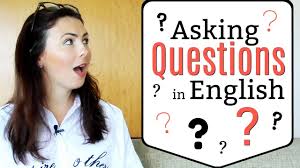(单词翻译:单击)
Hello! I'm Emma from mmmEnglish!
大家好,我是Emma,来自Emma的美味英语。
Asking questions and giving answers are the basics of great conversation, in English and in any language!
不论是在英语还是任何语种中,提问和作答都是良好对话的基础!
But, are you doing it correctly in English?
但你在用英语对话的过程中是否进行正确的提问和作答了呢?
Many of my students can get by,
我的很多学生都能勉强应付这个问题,
they can get their message across even without the correct structure word order or intonation.
即使不用正确的结构、语序或语调,他们也能够传达信息。
But, it makes for a very bumpy awkward conversation!
但这会让对话变得异常尴尬!
In this lesson, I want to help you improve the structure of your questions,
本节课中,我想帮助你们改善问题的结构,
so that they flow smoothly, clearly, and automatically!
使你们提出的问题更加流畅、清晰和自然!
And finally, you can start enjoying English conversations!
最后你就会开始享受英文对话啦!
It's important to spend more time improving your Q&A skills!
花点时间提升自己提问和作答的技能是非常重要的。
Have you heard that before? Q&A.
你以前听说过Q&A吗?
It stands for questions and answers.
指的是问题和答案
You might have heard it somewhere before.
你可能以前在哪听过这个词。
First up, let's review question structure in English.
首先,我们来复习一下英语问题的结构。
Now, the good news is that English questions are fairly consistent and easy to follow because they have a clear structure.
好消息是英语问题都非常一致,而且易于模仿,因为它们有着清晰的结构。
There are four main parts that you need to keep in mind.
有四点你需要牢记在心。
The first part: question words, who, what, where, when, how, why
第一部分是:疑问词,包括谁,什么,在哪里,何时,如何,为什么
or question phrases like how long ,or how often, or how much.
或者像多长时间,多长时间一次,多少这样的疑问短语。
Then number two is your auxiliary verb or your helping verb: be, do or have.
第二个是你的助动词,be,do和have。
It can also be a modal auxiliary verb like can or will or should.
也可以是像can,will或者should这种情态动词。
Thirdly, you need your subject. I, you, we, etc.
第三呢,你需要主语,我,你,我们……
And your main verb, any verb! play, eat, buy.
然后就是你的主动词啦,任何动词都可以!玩,吃,买。
These are the four things that you need and you need them in that order, every time!
这是你所需要的四个元素,而你需要按顺序使用它们,每次都是这样哦!
Okay, let's try with some examples, ready?
好了,我们来尝试一些例句吧,准备好了吗?

Where do you live?
你住在哪里?
Question word, auxiliary, subject, main verb!
疑问词,助动词,主语,主动词!
What do you like about it?
你觉得这怎么样啊?
Question word, auxiliary, subject, main verb!
疑问词,助动词,主语,主动词!
How long have you been living there?
你住在那儿多久了?
Question phrase, auxiliary, subject, main verb!
疑问短语,助动词,主语,主动词!
Okay, so what about this type of question?
好的,那这种问题呢?
Do you live in England?
你住在英国吗?
In this question we don't have a question word but we do have all of the other parts of the English question structure.
在这个问题中没有疑问词,但是有英语问题结构所包含的其他所有要素。
We don't have the question word but we do have the auxiliary verb (do), the subject (you) and the main verb (live).
没有疑问词,但是有主动词do,主语你,主动词居住。
It's as simple as that, every time!
就是这么简单,每次都是这样!
This type of question is perfectly acceptable too.
这种类型的问题也是完全可以接受的呢。
You don't need to have a question word.
不需要一定要有一个疑问词。
There are two types of questions in English,
英文中有两种类型的问题,
closed questions, the questions which start with an auxiliary verb
封闭式问题,也就是以助动词开头的问题,
and open questions, questions which start with a question word or question phrase.
以及开放式问题,也就是以疑问词或者疑问短语开头的问题。
Keep that in mind for a few minutes.
用几分钟的时间记住这个。
Questions that start with an auxiliary verb or a helping verb are closed questions because they require just a simple answer, yes or no.
以助动词开头的问题是封闭式问题,因为它们的答案非常简单,是,或者否。
The detail is not really important.
细节不是特别重要。
Do you like the soup?
你喜欢汤吗?
No, I don't.
不,我不喜欢。
Can you help me for a minute?
你能帮我一下下嘛?
Yeah, I can.
是的,当然可以啦。
Have you been to Italy?
你去过意大利吗?
No, I haven't.
不,我没去过。
Are you enjoying the movie?
你喜欢这个电影吗?
Yeah, I am.
是的,我喜欢。
Another good tip here is the connection between the question and the answer.
另一个很棒的技巧就是问题和答案之间的衔接。
See how the answer directly responds to the information in the question.
看一下答案是如何直接和问题中的信息挂钩的。
Are you?
是吗?
Yeah I am.
是的。
No, I'm not.
不,我不是。
Have you?
你做过吗?
No, I haven't.
不,我没有。
Yeah, I have.
是的,我做过。
There are lots of patterns in English questions,
英文问题有很多模式,
so if you start paying attention to the detail, you'll really be able to improve your grammar.
所以如果你开始关注细节的话,你的语法肯定可以提高。


